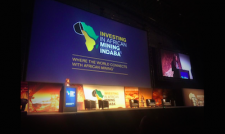
Indaba Day 1, Pt 3 of 3: Dr Moyo and the Doom
Economic Keynote: Global Shifts in Economics, Politics and Business - What's it Going to Take to be Successful in our Future World?
Dambisa Moyo, popular economist and contrarian, gave the afternoon keynote in the very impressive main hall. She started with a snap poll - who’s optimistic about the world and reckons next 20 years will be good? Evens in the room, but she came with a message of doom.
Everything, she said, is going to be bad - (assuming we are sited somewhere on the familiar economic ground where endless growth is what is good). The biggest risk, she said, “is that which you can't see today.” Fair enough... but then she went on to spend 45 minutes telling us what she could see. And none of it was good.
In short, growth at pre-2008 levels will never be seen again; political instability will rise; development will suffer and demographics will only enhance that suffering. “"Growth has to be 7% in order to make a meaningful dent in poverty,” she argued, and even the best merging economies are growing at 2-3%. Bearing in mind the huge bias in favour of under-25s in the developing world and the exemplars of Nigeria, Venezuela, Indonesia, etc. struggling with weight of populations for which they cant't create growth, “by 2025 80% of the world population will be living in fragile, politically unstable states."
There’s also growing scepticism re globalisation, with growth inequality a big problem. The world consensus is globalisation requires free markets and free people; but while China has neither and the USA has both, the two countries have the same GINI coefficient of about 0.47. And while China's income inequality has continued to improve, that of USA has gone the opposite way. “What, “ she asked, “does this mean about our ability to create growth?”
This led to the interesting argument that from an economic point of view democracy is overrated. Displaying a tendency to cherry pick her examples she cited Pinochet, Fujimori and Lee Kwan Yew show as proof that democracy isn’t needed for growth. It was a flaw that ran through few arguments: pre-World Cup riots in Brazil and the situations in Turkey and Ukraine were presented as proof of rising global instability; but we had trouble swallowing this. Does Brazil riots+Turkey+Ukraine really equal the end of development? After all, the 1990s had the Gulf, the Balkans and Rwanda...
The more serious point, though, was an inverse one: the ability for democracy to survive over time is highly correlated with per capita income. And growing that is going to be a problem.
The future is increased protectionism; decreased cross-border flows; rising financial repression and the rise of the state. Technology will erode jobs and all these trends are ...and all of these trends are set to continue. Globalised businesses will become more significantly siloed and individualistic as cross border investments are increasingly challenged by host governments. Capital flows to fall and it'l get harder to repatriate returns on investment in foreign jurisdictions.
The answer to the question was left begging, really. What will it take to be successful? A very big army, perhaps. Hard to tell. It could be that this is prescient stuff: though the manner in which the argument was put left us wanting a touch, the logo was sound and the picture - while unpleasant - not in the least unimaginable. The world has shown a wonderful ability to ignore the dangers in the past; it’ll be interesting - at the very least - to see what happens over the next couple of decades, how right Dr Moyo turns out to be, and what - if anything - those in the room end up doing about it.
ENDS
Photo taken at 2015 Investing in African Mining Indaba, 9-12 February in Cape Town, South Africa.





